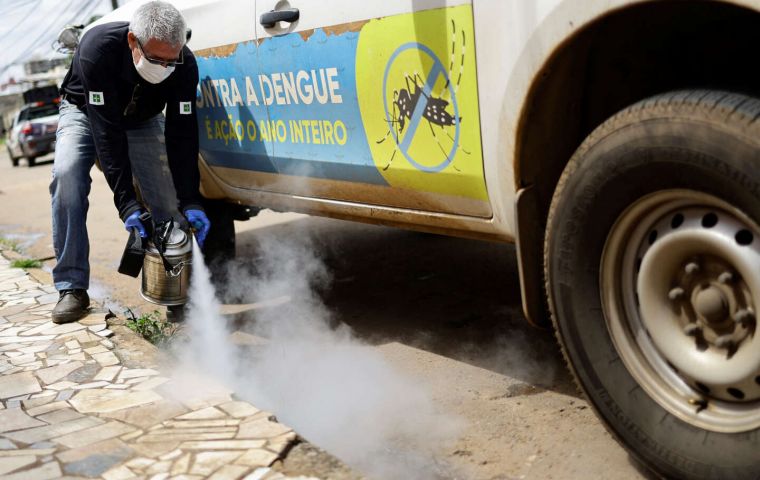MercoPress. South Atlantic News Agency
Covid-19 cases on the rise in Sao Paulo and in the region
 It is possible to have both viruses at the same time: Covid-19 and dengue
It is possible to have both viruses at the same time: Covid-19 and dengue Authorities in the city of São Paulo have reported that the number of Covid-19 cases more than tripled between the first epidemiological week of 2024 (Dec. 31, 2023, to Jan. 6, 2024) and the sixth (Feb. 4 to 10) after growing from 881 detections to 3,443, according to the interactive panel of the Municipal Health Department (SMS).
David Uip, national director of infectiology at Rede D'Or, said there should be even more cases since “most tests are done at home and are not reported to the government.” Hence, “the figures given by the health authorities tend to be lower than the reality,” he went on.
Infectiologist Emy Gouveia of São Paulo's Albert Einstein Hospital said the increase in Covid-19 cases in recent weeks was associated with the circulation of a new variant in the country. “The JN.1 variant of the omicron arrived in Brazil at the end of 2023, and whenever there is the arrival of a new variant, there is the possibility of an increase in cases.”
The scenario is likely to worsen throughout Brazil with the Carnival celebrations, according to infectiologist Renato Grinbaum of the Brazilian Society of Infectious Diseases (SBI). “The Covid-19 virus is transmitted through exposure to contaminated respiratory fluids, which is favored by the crowds typical of this period.” But “unlike during the pandemic, today a large part of the population has already had contact with the virus and is vaccinated - and therefore better protected,” he stressed.
With dengue rampant in Brazil, physicians have warned that some of its initial symptoms are often similar to those of Covid-19, which may cause confusion. “In both cases, fever, body aches, and malaise are common. That's why specialists in the health system need to be well prepared to make the diagnosis properly,” says Uip.
Gouveia insisted that the differentiation between dengue and Covid-19 is made by the doctor's assessment and specific laboratory tests while being infected with both viruses at the same time is also possible.
Uruguay
Meanwhile, Uruguayan authorities have also reported an increase in the circulation of the JN.1 variant, after which vaccination with a booster dose was extended Wednesday to those over 50 years of age with comorbidities. The messenger RNA vaccines are monovalent and are adapted to the variants currently circulating in the region, and should be applied six months after the last dose, regardless of the number of previous doses, the experts have said. On Jan. 29, Uruguay started a new vaccination campaign in which a booster dose was offered to the population of long-stay facilities for the elderly.
Three days later, it was made available for pregnant women, people over 80 years of age, and immunosuppressed patients. Since Feb. 8, people over 70 years of age and people with Down syndrome could also be vaccinated.
As a result of the Coronavirus outbreak, the demand for masks and alcohol gels has increased, it was also reported in Montevideo. Health Minister Karina Rando, announced last month that the coronavirus was circulating in Uruguay with a sustained “moderate intensity.”




Top Comments
Disclaimer & comment rulesCommenting for this story is now closed.
If you have a Facebook account, become a fan and comment on our Facebook Page!